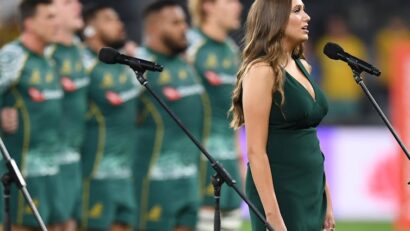
50 years on, Advance Australia Fair no longer reflects the values of many. What could replace it?
On April 8 1974, Prime Minister Gough Whitlam announced to parliament the nation’s new national anthem: Advance Australia Fair.
Australia was growing up. We could stop saving “our gracious Queen” and rejoice in being “young” and “girt”.
Finding a new anthem hadn’t been easy. There were unsuccessful songwriting competitions and an unconvincing opinion poll. Finally, we landed on rebooting an Australian favourite from 1878.
After Whitlam’s announcement, Australians argued, state officials declined the change and the next government reinstated the British anthem in part. It took another ten years, another poll and an official proclamation in 1984 to adopt the new anthem uniformly and get on with looking grown-up.
Advance Australia Fair was never the ideal answer to “what shall we sing?”. The original lyrics ignored First Nations people and overlooked women. Like a grunting teenager, it both answered the question and left a lot out.
On its 50th anniversary, it’s time to consider whether we got it right. Advance Australia Fair may have helped Australia transition through the 1970s, but in 2024, has it outstayed its welcome?
How do you pick a national anthem?
A national anthem is a government-authorised song performed at official occasions and celebrations. It unifies people and reinforces national identity. Often, governments nominate a tune by searching through historical patriotic songs to find a golden oldie with known public appeal.
For example, the lyrics of the Japanese anthem Kimigayo came from pre-10th-century poetry. Germany’s anthem Deutschlandlied adopted a 1797 melody from renowned composer Joseph Haydn. An enduring song or text offers star quality, proven popularity and the prestige of age.
In the 1970s, Australia’s attempt at finding a golden oldie was flawed. In that era, many believed Australia’s birth occurred at the arrival of explorer James Cook in 1770. Hence, we narrowed our search to hymns, marches and fanfares from our colonial history for possible anthems.
With 2020s hindsight (pun intended), expecting First Nations people to sing Advance Australia Fair was hypocritical. We wanted to raise Australia’s visibility internationally, yet the custodians of the lands and waterways were unseen by our country’s eyes. We championed “history’s page” with a 19th-century song that participated in racial discrimination.
In 2020, Indigenous woman Olivia Fox sang Advance Australia Fair in the traditional Eora language at a rugby match in Sydney.
Dean Lewins/AAP
Changing anthems
With a half-century on the scoreboard, are we locked in to singing Advance Australia Fair forever? No.
Anthems can change. Just ask James Morrison. In 2003, the Australian trumpeter played the Spanish national anthem beautifully at the Davis Cup tennis final. Unfortunately, he played the old anthem that heralded civil war.
Morrison’s accidental performance incited a fist-shaking dignitary and an enraged Spanish team who temporarily refused to play. Morrison did, however, to his embarrassment, later receive some excited fan mail from Spanish revolutionists.
If we want to change our anthem, where could we begin? We could start by revisiting the golden-oldie approach with a more inclusive ear. Perhaps there’s a song from contemporary First Nations musicians we could consider, or a song from their enduring oral tradition that they deem appropriate (and grant permission to use).
If we have learnt anything from Australian history, it’s that we must include and ask – not exclude and take.
We could also consider Bruce Woodley and Dobe Newton’s 1987 song I Am Australian, which reached golden-oldie status last year when the National Film and Sound Archive added it to their registry. The lyrics show the acknowledgement and respect of First Nations people that our current anthem lacks. The line “we are one, but we are many” captures the inclusivity with diversity we now value.
I Am Australian wouldn’t be a problem-free choice. Musically, the style is a “light rock” song, not a grand “hymn”, which could be a plus or minus depending on your view. Lyrically, romanticising convicted killer Ned Kelly is controversial, and mispronouncing “Australians” could be considered inauthentic (fair dinkum Aussies say “Au-strail-yins”, not “Au-stray-lee-uhns”).
That said, Australians are quite experienced at patching holes in our anthem. Advance Australia Fair required many adjustments.
Read more:
The Australian National Anthem has a big problem – the average Aussie can’t sing it in tune
If the golden-oldie approach fails again, how about composing a new anthem? We could adopt Kenya’s approach of commissioning an anthem, or could revive the good ol’ songwriting competition. Our past competitions weren’t fruitful, but surely our many talented musicians and poets today can meet the challenge.
It’s time to ask
Fifty years on, we acknowledge Advance Australia Fair as the anthem that moved our nation forward. That was the first and hardest step. Today, if Australians choose, we can retire the song gracefully and try again with a clearer voice.
Changing our anthem begins with asking whether the current song really declares who we are. Have our values, our perspectives and our identity changed in half a century?
Australia, it’s your song. Are you happy to sing Advance Australia Fair for another 50 years?
Read more:
Our national anthem is non-inclusive: Indigenous Australians shouldn’t have to sing it Läs mer…